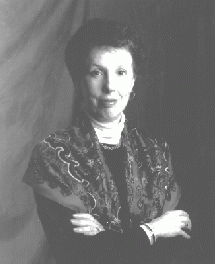Page 54
[Begin Tape 1, Side A]
Moorhus: Deborah, this is our fifth session together, and we want to start with a little bit of recap and then some summary kinds of questions. You were born in Texas, and your father was a journalist. Over the years, what influence did your father and his career have on your life and your career?
Howell: You grow up chasing fires and listening to the news and being aware of what news is, so from the time I was really a little girl, I was highly aware of stories, and that my father covered stories and that he did the news, whether or not he was working on a newspaper or in his radio and TV career, that deadlines were deadlines and that this was very important work. So I grew up in that milieu.
Then as I grew up in high school and worked on the school paper and the school annual and all that, and thought I might become a newspaper person, my father was not all that thrilled. He said, "I don't want you to become of those hard-talking news hens." Give me a break. He really thought it was too tough a life for a woman and too tough a life in general, and many times since then I've remembered my father told me not to do this. But by the time I had gone to college and worked at the University of Texas on the Daily Texan, I was totally hooked, and there was no turning back. He was quite supportive then, although I think he was a little jealous sometimes. He used to ask me how much I made, and I told him until I was nearing to what I knew was the last salary he made, and then I'd just say, "Well, not as much as you ever did, Daddy." [Laughter.] Saving his ego.
But I can remember tons of times when I was a little girl, my father having to rush into the office on a big story, or, you know, just switching on the radio and listening. I woke up every morning to his 7 a.m. newscast in San Antonio, and that has a big effect. And hearing public affairs talked about, hearing journalism talked about as something valuable to do, and hanging around his office, I mean, oh, it was fun to hang around his office with all these old-time news guys, you know. He'd send me out in the cruisers with his police reporter who was just a complete character, and I would be terrified I was going to get killed on the way to some fire or something, with this guy who drove like a bat out of hell. Or if there was a fire, if my father could see a fire, we would go to it. If he heard the trucks, he would get in the car and go wherever it was. He just couldn't stand not to know what was going on—a characteristic I inherited from him.
Moorhus: Other than your father, who was the most important mentor to you?
Howell: Oh, that's a tough question. In journalism, my high school journalism teacher. In college, I began to have a lot of mentors. Some were students who were just a little bit further along than I was, but I had a number of professors at the University of Texas who were very important mentors to me and taught me a lot.

